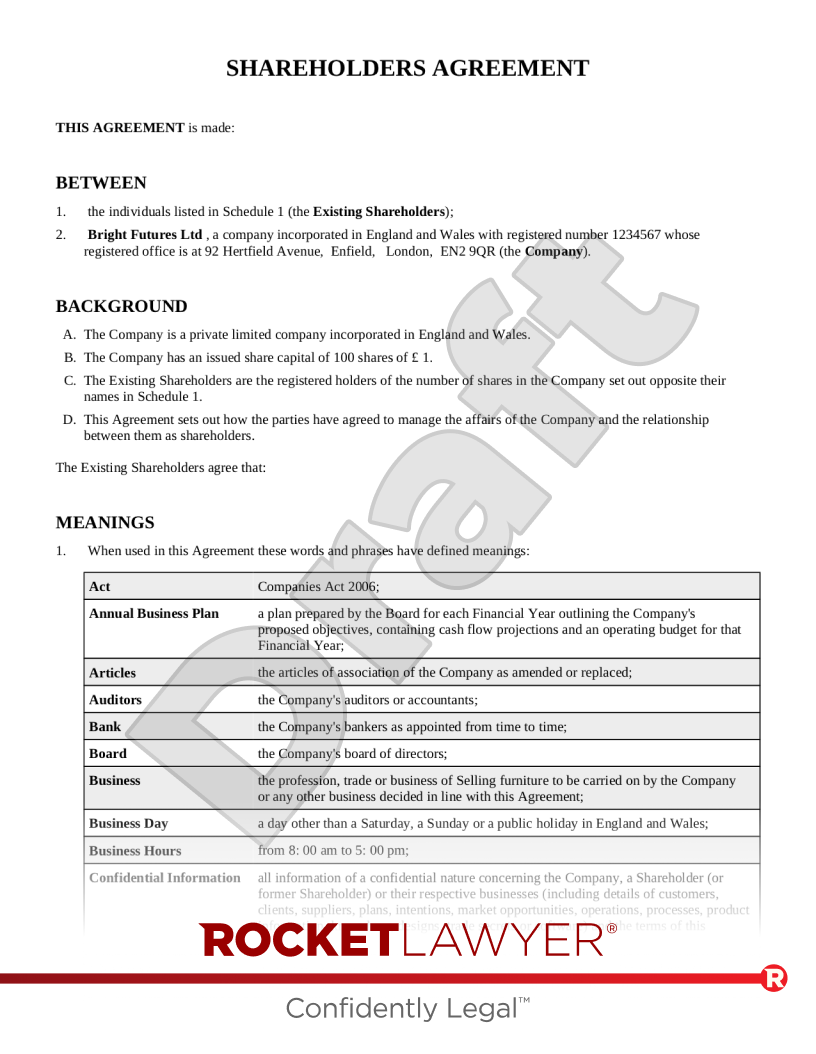Why might a company need to issue shares?
Company formation
In order to form a private limited company, one or more shares must be issued. This must be set out in a 'statement of capital' and normally distributed amongst directors and investors. The only exception is in the case of companies limited by guarantee (eg charities and non-profit organisations). The proportion of shares given to each shareholder at the outset will generally reflect the value of their contribution - either in terms of initial investment or skills and experience - to setting up the business.
New investment
An established company may need to create additional shares if it wants to bring in a new investor, as a way of providing them with equity in the business. This may be with a view to funding a new project, taking on a new member of staff or simply expanding the business.
Negotiating business deals
New shares can be issued to offset company debts or as a bargaining chip when trying to acquire another business. A new business partner may demand a certain number of shares before they come on board.
Employee share schemes
Some companies offer shareholder contracts to their employees, in exchange for giving up certain employment rights such as unfair dismissal or statutory redundancy pay. John Lewis is well known for distributing its annual profits amongst staff and many other companies are offering this type of model to attract new talent. Occasionally, shares may also be offered to staff in lieu of cash bonuses.
For more information on these schemes, read Employee share schemes.
What is the process for issuing shares?
Shares can be privately offered to an individual or business. The company directors must first decide:
-
how many new shares it wants to issue, and
-
check the company articles to find out if they have authority to do so (companies incorporated before October 2009 may need to ask their shareholders to pass an ordinary resolution)
They also need to ensure that the proposed share issue complies with any pre-emption rights (a shareholder's right of refusal over the issue of new shares) or other restrictions contained in their Articles of association or Shareholders' agreement.
Once everything has been approved and the allotment of shares has been authorised, payment or business contracts relating to the allotment of shares should be finalised before Share certificates are issued to the recipients.
When issuing new shares, the shares can be purchased for their nominal value (ie the face value of the shares). This is usually £1 for most types of shares. However, shares can also be sold for higher than their face value to be in line with current market rates. Any amount above the nominal value is known as a 'share premium'.
The next step is to fill out form SH01 and submit this to Companies House, which should take place within a month of the allotment. The register of members should also be updated within two months of the allotment and the names of the new shareholders must be included in the next confirmation statement so that the share allotments are correctly reflected in the company accounts.
Why might shares need to be transferred?
Existing shares can be transferred to new recipients, either for business or personal reasons, rather than issuing new shares.
Shareholders may decide to relinquish some of their shares and transfer them to a new key business partner in order to bring them on board. Alternatively, a shareholder may want to transfer some (or all) of their shares to their spouse or a family member, as a gift. Shares can also be sold in return for cash or other assets (such as shares in another business).
What is the share transfer process?
First, check your company's Articles of association or Shareholders' agreement. If the relevant authorisations are in place, a Stock transfer form should be completed and provided to both the transferor and transferee. If stamp duty is payable, the stock transfer form is sent for stamping and stamp duty is paid. The transfer should then be considered by the board before being approved. The Share certificates being transferred are then cancelled and new ones are issued. The transfer should be confirmed as part of the next confirmation statement to Companies House.
Stamp duty is payable by the purchaser of the shares if the purchase price exceeds £1,000 or none of the exemptions apply. The rate of stamp duty is set by the Government (as of April 2022, this is 0.5%). If a share transfer is exempt from stamp duty, one of the certificates on the back of the stock transfer form must be filled in - unless there has been no payment in consideration for the transfer.
For more information, read Stock transfer forms.
What is the difference between issuing shares or transferring shares?
The main difference is that issuing (or allotting) shares creates new shares which are distributed amongst shareholders - often when a company is set up.
Share transfer, by contrast, involves the transfer of existing shares - always after the company has been formed. Also, stamp duty is normally payable by the purchaser when shares are transferred, but not in respect of shares issued.




